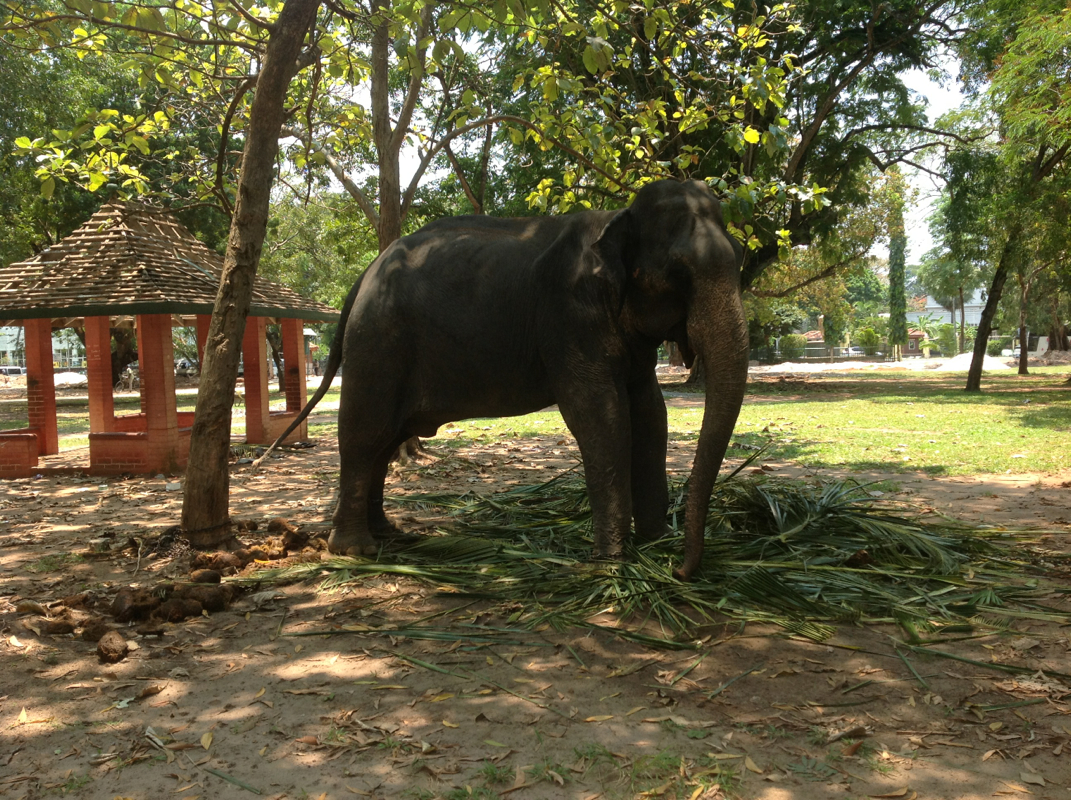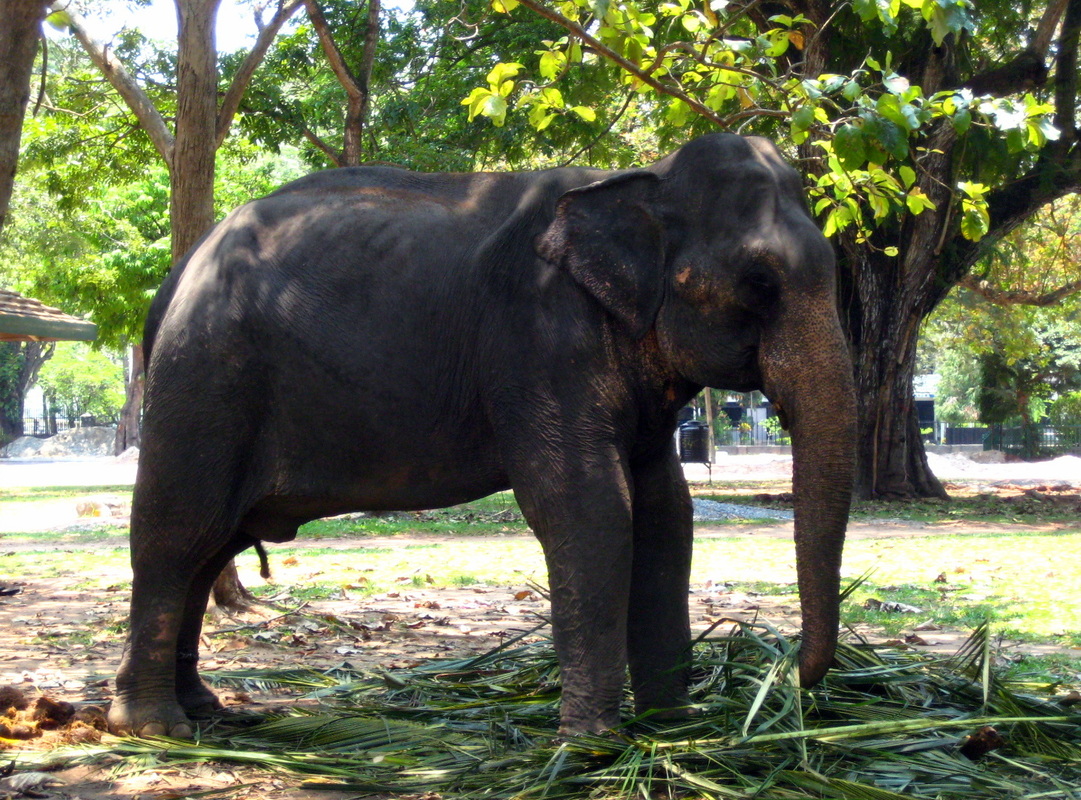I headed west toward the coast. Along the way, I came across Viharamahadevi Park, one of Sri Lanka's many municipal parks. It was a vast expanse of shady trees punctuated by a central lake bifurcated by a crumbling bridge. Given the unrelenting heat, I decided to seek temporary refuge among the park's promising verdant environs (at least this much I have learned as a result of studying the urban heat island portion of the LEED Green Associate exam). Unsurprisingly, I was approached by a man in a baseball cap alleging to be the park's gardener. "Have you seen the elephant?" the man inquired with feigned innocence. "Here, I can show you. I'm the gardener," I was assured. But before our interaction devolved into a redux of my first encounter with a Sri Lankan snake oil salesman I trotted away, firmly implying my resolve to avoid interaction. As casually as he had arrived, the man slowly retreated back into the urban forest. Perhaps he had spied a more unwitting prey. Yet, having only seen an elephant once so far on my trip, for a couple moments at a Buddhist temple, I was intrigued by the prospect of seeing a pachyderm again. Thus, I crept along the outer rung of the park following a semi-circular course until the constant gardener was far afield. Then, I turned about face and dove back into the park until I hit a concrete path which roughly traced the natural contours of the lake. After permitting the walkway to serve as my unofficial (and certainly more trustworthy) guide, I stepped out onto the cool grass in search of wildlife of the mega herbivore variety. Although I enjoyed the visual assistance of my prescription sunglasses, the interior of the park was rather dark, as the shade of long trees cast shadows that overlapped, obscuring the unfamiliar landscape. Yet, among the broad brown limbs scattered about the habitat I could perceive some kind of repetitive undulation occurring several feet above the ground about 200 feet away. To be sure, this was no national flag playing a patriotic song to the gentle park wind; the quietly rippling fabric was circular and gray. As I drew closer, I could make out that this steel-colored sail was affixed not to a metal pole, but a large mass which appeared to be moving, albeit with great deliberation. To my shock, I had found the elephant of which the gardener spoke. Given my childhood experiences visiting zoos, combined with the fact that I passed by a self-contained aquarium near the entrance to the park, I had imagined that any elephant I might see would be encased behind glass, or fenced off from onlookers at least. However, here stood a mighty elephant, poised as gracefully among trees as a humpback whale swims beneath rough seas, standing prominently, if slightly hidden, in the open space of a public park, with no discernible fence or glass barrier in place. Instead, this battleship gray behemoth was tethered by puny chains, objectionably reminiscent of slave bindings, to two nearby trees. My childlike curiosity and fondness for animals of overwhelming stature took hold, and I proceeded to get as close as I could to the elephant in order to take a photograph of uncommon proximity. No matter how close I came, the elephant stirred little. Sleepily the elephant chewed on what appeared to be palm fronds, its only remarkable movement the occasional lifting of its front right foot. Either this animal was no stranger to the presence of humans (even increasingly encroaching ones, such as myself), or else the fronds had a soporific effect on the elephant, lulling it into a state of relaxed serenity. After capturing the moment to the best of my ability while still being cautious enough not to rile the creature in case its more instinctual inclinations suddenly took hold, I exited the same way I came in, only this time I walked through the park with a cherished memory in tow. (As a brief side note, it was really charming to see the park populated by so many young, loving couples. Midday in Viharamahadevi Park seemed to be Sri Lanka's answer to the lookout point of American romantic lore. This contrasts greatly with Nepal, where public displays of affection are culturally shunned.)
My appetite for elephant viewing sated, I walked onto the suffocating streets of steam and sun. By the time I had returned to the hotel, I must have been at least a couple pounds lighter. I felt that the best course of action would be to hydrate, eat, and cool off before my next interview at 4pm. Internally I surmised that while two interviews per day would be technically feasible, it would be incredibly exhausting to attempt any more and expect to be fully functional.
I left the hotel at 3pm to meet with Dr. Jayantha Dhanapala, a seasoned diplomat and former UN Under Secretary General who had been suggested by Prof. Lakshman Guruswamy at the University of Colorado-Boulder, at his residence in Nugegoda, which is just outside of Colombo. As my taxi came upon the entrance to the home, thunder sounded convincingly in the near distance. As a native son of Florida, lightning capital of the world, I spent my formative years in an area where thunder and lightning were as commonplace as sunburns and Spanish. Yet, living in California for the past five years, I have been robbed of these elemental features which I came to associate with rain (i.e. water droplets which fall from the sky, for those of you in Southern California who are unfamiliar with this form of weather). Slightly pleased that I might encounter thunder, lightning, and rain reunited in beautiful concert once again, I greeted Dr. Dhanapala and we settled into his den, a wall-to-wall celebration of an impressive career in diplomacy, to commence with the interview. I was graciously welcomed into the statesman's home and fixed a spot of tea, as is customary in this part of the world. While we covered the issue of environmental rights to the extent it was possible given my respondent's background in diplomacy and not environmental policy, I was interested to learn that Prof. Guruswamy had been Dr. Dhanapala's best man at his wedding years ago. After the interview was complete, Dr. Dhanapala introduced his daughter, Dr. Kiran Dhanapala, a trained economist who works on environmental issues, specifically energy, throughout South Asia. In the middle of our conversation the lights shut off unexpectedly thanks to the lightning and troubled electrical system, and we relocated our ad hoc seminar to the porch. Our discussion touched upon a panoply of topics, from green buildings to American politics to student debt, and as a result of the storm, which was beginning to produce precipitation with monsoon alacrity, we retreated indoors to the living room. Our roundtable concluded around 30 minutes later, and a cab was ordered for me so that I could venture back to my HQ.
My day ended with a hearty Italian meal at Echo, a restaurant adjoining the Cinnamon Grand Colombo, and I made my way back to my hotel room to catch up on emails and prepare for the next day.


 RSS Feed
RSS Feed